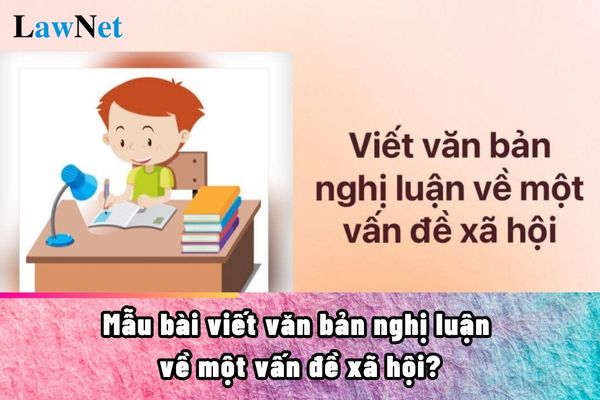Whgat are sample argumentative essays on a social issue for grade 9 students in Vietnam? What are 9 literary knowledge contents that grade 10 students in Vietnam must achieve after studying Literature?
Whgat are sample argumentative essays on a social issue for grade 9 students in Vietnam?
Writing argumentative essays about a social issue is one of the contents that students will become familiar with and study in detail in the grades 10 and 11 Literature program.
|
Sample argumentative essays on a social issue Sample 1: The Negative Effects of Excessive Use of Social Media among Youth
Trong xã hội hiện đại, vấn đề người già sống một mình, cô đơn ngày càng trở nên phổ biến. Nguyên nhân của tình trạng này có thể là do sự thay đổi của cấu trúc gia đình, quá trình đô thị hóa, con cái đi làm xa, hoặc đơn giản là do tuổi già sức yếu. Sự cô đơn của người già không chỉ ảnh hưởng đến sức khỏe tinh thần mà còn gây ra nhiều hệ lụy xã hội. Để giải quyết vấn đề này, cần có sự chung tay của cả xã hội. Nhà nước cần có những chính sách hỗ trợ người già, xây dựng các trung tâm chăm sóc người cao tuổi. Các tổ chức xã hội cần tổ chức nhiều hoạt động dành cho người cao tuổi để họ có cơ hội giao lưu, kết nối với cộng đồng. Mỗi người chúng ta cũng cần dành thời gian quan tâm, chăm sóc ông bà, cha mẹ của mình. |
Note: The above information is for reference only./.

Whgat are sample argumentative essays on a social issue for grade 9 students in Vietnam? What are 9 literary knowledge contents that grade 10 students in Vietnam must achieve after studying Literature? (Image from the Internet)
What literary requirements shall students in Vietnam meet in grade 10 Literature curriculum?
Pursuant to Subsection 2, Section 5 of the General Education Program in Literature issued together with Circular 32/2018/TT-BGDDT, after studying literary texts in grade 10 Literature, students should meet the following requirements:
[1] Content Comprehension
- Be able to comment on the overall content of the text; analyze significant details, topics, stories, characters, and their relationships within the integrity of the work.
- Analyze and evaluate the theme, ideology, and message that the text wants to convey to the reader through its artistic form; analyze several bases to determine the theme.
- Analyze and evaluate the feelings, emotions, and dominant inspiration that the writer expresses through the text. Discover ethical and cultural values in the text.
[2] Form Understanding
- Identify and analyze several elements of epics and mythological stories such as: space, time, plot, characters, narrative voice, and dialogue,...
- Identify and analyze several elements of stories such as: characters, story, third-person omniscient narrator and first-person limited narrator, viewpoint, narrator's and character's words,...
- Analyze and evaluate the aesthetic value of various elements in poetry such as words, imagery, rhyme, rhythm, contrasts, lyrical subjects, and lyrical characters.
- Recognize and analyze several elements of Cheo or Tuong texts such as: theme, anonymity, plot, characters, dialogues, transmission methods,...
[3] Connect, Compare, Relate
- Apply knowledge about Nguyen Trai to understand some of his works.
- Identify and analyze historical-cultural contexts represented in the literary text.
- Relate to find similarities in content between literary works from two different cultures.
- Highlight the significance or impact of a literary work on readers' views, perspectives, thinking, and emotions; express one's feelings and personal evaluation about the work.
[4] Broaden Reading
- During one academic year, read at least 35 literary texts (including texts guided for online reading) with genre and length equivalent to those studied.
- Memorize a few poems or fragments of favorite poems from the curriculum.
What are 9 literary knowledge contents that grade 10 students in Vietnam must achieve after studying Literature?
Also stated in Subsection 2, Section 5 of the General Education Program in Literature issued together with Circular 32/2018/TT-BGDDT, the literary knowledge for grade 10 students includes:
- The dominant inspiration of the work
- Story, third-person omniscient narrator, first-person limited narrator, viewpoint in the story
- Several elements of epics and mythological stories: space, time, plot, narrative voice, characters, narrator and character's words,...; the value and vitality of epics
- Aesthetic value of various formal elements in poetry
- Some elements of folk Cheo or Tuong scripts: anonymity, theme, plot, characters, dialogues, transmission methods,...
- Historical context or cultural, social context and the work
- Basic knowledge about Nguyen Trai aiding the comprehension of some of his representative works
- Content similarities between literary works from different cultures
- Literary works and the reader.

